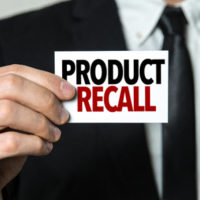FDA Issues Class I Recall for Jaundice Meters

While defective drugs that produce life-threatening side effects often get the bulk of public and media attention, it is important not to overlook the critical harms posed by defective medical devices. In particular, when a diagnostic device produces inaccurate or misleading readings, it can lead doctors to prescribe in an inappropriate course of treatment. This in turn can produce its own serious side effects–and even death–depending on the patient’s condition.
Draeger Device Results May Lead to Under-diagnosis of Hyperbilirubinemia
On May 21, 2018, the U.S. Food and Drug Administration (FDA) issued a Class I recall for two models of jaundice meters produced by Drägerwerk AG (Draeger), a German medical device manufacturer. A Class I recall represents an urgent warning to the public that a device poses a “significant and immediate danger” of death or serious injury to patients. The goal of such a recall is to ensure the offending product is completely removed from the market as quickly as possible.
In this case, the FDA ordered the recall of the JM-103 and JM-105 models of the Draeger Jaundice Meter. These are specialized devices used by doctors to monitor newborn infants. It is designed to be used in conjunction with other “clinical assessments” to determine if a child suffers from hyperbilirubinemia, commonly known as “jaundice.” Hyperbilirubinemia is the result of excessive bilirubin–a chemical produced by the breakdown of red blood cells–in a baby’s blood. The color of bilirubin produces the typical yellow jaundiced appearance.
While most babies develop some degree of jaundice during their first days of life, hyperbilirubinemia can, if left untreated, cause high levels of bilirubin to enter a baby’s brain. If this happens, the child may suffer seizures and ultimately brain damage.
The Draeger meters are supposed to measure bilirubin levels. But according to the FDA, some doctors and clinicians have “misinterpreted display messages” in the JM-103 and JM-105 meters that “have resulted in serious injuries” to newborns. More specifically, the meters display confusing messages that apparently lead some doctors to conclude infants have low or zero bilirubin levels, when in fact they actually have high levels that need to be treated.
As part of the recall, Draeger agreed to provide “upgraded software” for the JM-105 and JM-103 devices. The company has also provided its customers with additional labeling and instructions on how to properly interpret their meters’ results. However, the company continues to insist that the meters are “not intended to be used as a standalone screening device for diagnosis of hyperbilirubinemia.”
Speak with a Clifton Forge Defective Medical Device Attorney Today
Medical device manufacturers are often eager to cooperate with the FDA and other regulatory agencies in an attempt to show they are taking a product defect seriously. But such cooperation often comes too late for the patients who have already been injured due to a manufacturer’s negligence. If you or a member of your family have been injured by a dangerous medical device and you need legal advice from a qualified Tennessee personal injury lawyer, contact the offices of Fox, Farley, Willis & Burnette, Attorneys at Law, today.
Source:
fda.gov/medicaldevices/safety/listofrecalls/ucm611564.htm
